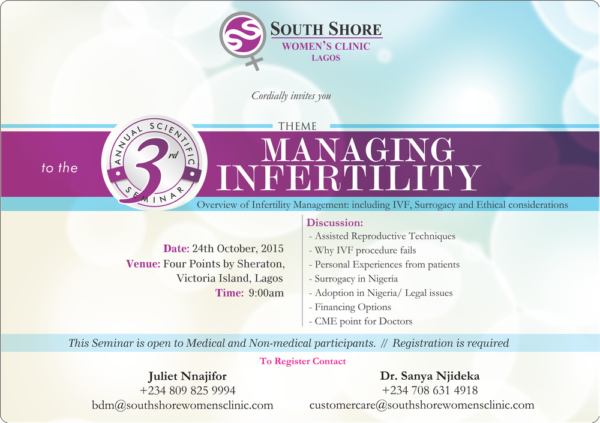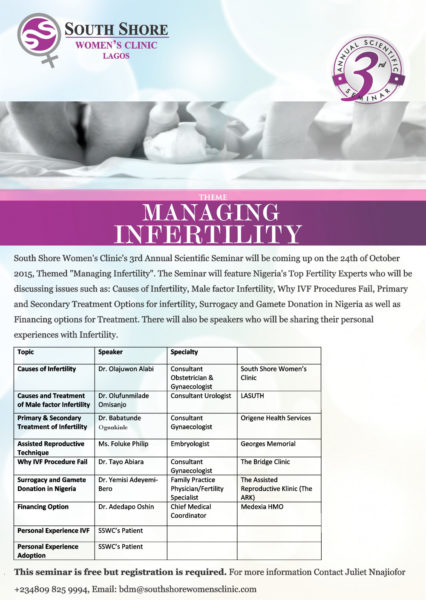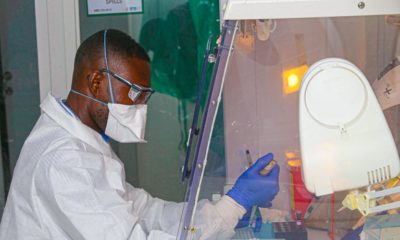Events
All You Need to Know About Managing Infertility – South Shore Women’s Clinic
BellaNaija recognizes that in Nigeria and all over the world, the issue of infertility plagues many men and women. We realize that there is so much information on the subject out there, and researching the right remedies that work for each unique individual can be a bit overwhelming. That is why we decided to partner with South Shore Women’s Clinic for their conference focused on Managing Infertility.
As part of that partnership, in collaboration with South Shore Women’s Clinic, we bring you this updated fact sheet on infertility. We hope that this information helps those dealing with infertility make informed decisions. In addition, we hope this sensitizes others, so the next time someone tells you they are dealing with infertility, you are informed and emphatic.
What is infertility?
The World Health Organization defines infertility as the inability to achieve a clinical pregnancy after 12 months of regular unprotected intercourse. It may be due to a single cause in either the female or male partner, or a combination of both.
Prevalence rate in Nigeria
About 25% of couples in Nigeria have challenges with conceiving a child and the need to seek medical help to achieve this.
The desire to bear one’s own children is one that is inborn in most people and fertility issues can cause a lot of anxiety.In Nigeria, our society, culture, tradition and even religion all put on more pressure, by almost demanding that a couple who are unable to bear a child within the first few months of trying is somehow ‘wrong.’
Factors
Male factors include production of abnormal sperm and/or problems with delivery of normal sperm into the uterus during intercourse. For females, causes include a low quality of eggs produced (age related, endometriosis, and premature ovarian failure), disorders of ovulation (hormonal imbalance, obesity, weight loss, stress), tubal dysfunction (PID, previous surgeries in the uterus or abdomen, endometriosis, fibroids), problems with the uterine cavity (fibroids, polyps, scar tissue). In about 10% of cases, there is no definite cause found.
Treatment
The doctor starts out by asking questions about the frequency of intercourse, menstrual periods, knowledge of ovulation days, previous pregnancies (if any) and outcomes, previous gynaecological procedures, surgeries, illnesses and medical conditions, any regular medications, alcohol intake, cigarette smoking, and any fertility treatments that may have been done already.
The next step is to do some investigations. The basic tests are an abdominal scan to examine the uterus, blood tests for a hormonal profile, and a special X-ray called a hysterosalpingogram to determine the condition of the Fallopian tubes. For males, a seminal fluid analysis is done. In most cases, these are sufficient to make a diagnosis and recommend initial treatment.
The specific management depends on individual couples and the identified cause. It can be as uncomplicated as lifestyle modification, losing or gaining weight, reducing stress, determining ovulation dates and having timed intercourse, using medications to induce ovulation and/or treat hormonal imbalances, or as complicated as having a surgery for removal of fibroids and scar tissue, treating endometriosis,and testicular surgery in males. Minimally invasive surgeries likehysteroscopy or a laparoscopy may be done where available because they are associated with faster recovery, fewer complications, and better outcomes.
Sometimes, medical and surgical treatments alone are insufficient to achieve pregnancy, and the couple may need to go for fertility treatments or Assisted Reproduction Technology (ART).
Simply put, this involves bypassing sexual intercourse and directly causing the sperm and the egg to meet. Intrauterine insemination (IUI) is a method of directly placing concentrated sperm directly into the uterus around the time of ovulation and is commonly used in cases of normal forms of sperm with low motility.
In Vitro Fertilization (IVF) involves retrieving mature eggs from the ovary, and allowing them to be fertilized by sperm in a laboratory. The fertilized eggis grown for a few days and then placed back into the uterus. With IVF, couples have the option of using donor sperm or eggs where necessary, or placing the embryo in the uterus of another woman (a surrogate) if the female partner’s womb cannot support a pregnancy.
While IVF provides hope to a lot of couples who cannot conceive on their own, it is usually more expensive than other forms of management, and involves a longer treatment schedule. Up to half of IVF procedures will be unsuccessful, and sometimes it works only after a few tries.
Adoption remains as another option for having a child, but it is one that is not yet widely accepted in this country, with a lot of bureaucracy and red tape involved, discouraging couples who may be interested. Many have been cheated out of large sums of money or simply opted for illegal means of adopting a child.
Couples who have challenges getting pregnant should remember that it is important to seek professional help on time, because increasing age is generally associated with reduced fertility chances. See a doctor for a review and undergo the required investigations.
Make sure that you understand fully whatever diagnosis is made, the various treatment options, their cost implications, success rates, and possible side effects. Sometimes you will need to see a different doctor for a surgery or proper management of a medical condition before commencing treatment and this can be discouraging.
It may help to learn from the experiences of others, either personally or through support groups and various online mediums. Most importantly, a couple should be a team and work together. Don’t play the blame game and thus discourage one another. Do not lose hope, but stay positive.
Event Details
Theme: Managing Infertility
Date: Saturday, October 24th
Time: 9 AM
Venue: Four Points by Sheraton Hotel, Victoria Island, Lagos
Photo Credit: Dreamstime.com/Monkey Business Images
________________________________________________________________________________________________________
BellaNaija is a Media Partner with South Shore Women’ Clinic‘s ‘Managing Infertility’ Seminar























